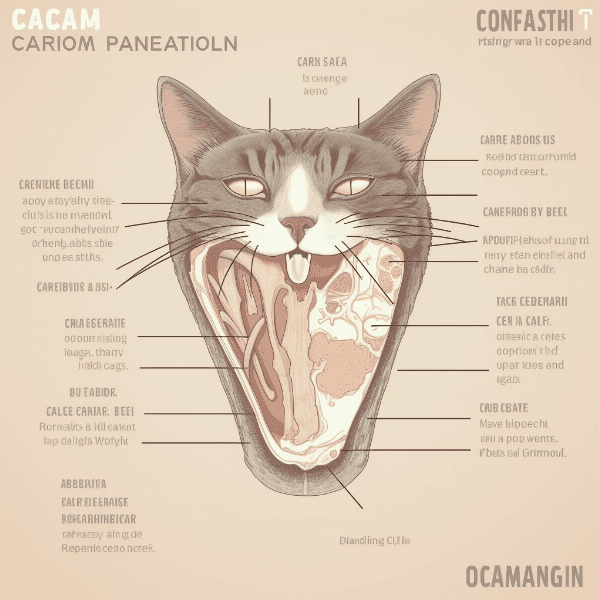Table of Contents
- Understanding Stomach Cancer in Cats
- Signs and Symptoms to Watch for
- Diagnosis and Treatment Options
- Prevention Strategies for Stomach Cancer
- Nutritional Support for Cats with Stomach Cancer
- Coping with a Stomach Cancer Diagnosis in Your Cat
- Follow-up Care and Monitoring
- Other Digestive System Concerns in Cats
- Research Advances and Future Outlook
- Resources for Cat Owners Dealing with Stomach Cancer
Understanding Stomach Cancer in Cats
Stomach cancer is a serious and potentially life-threatening disease in cats. It occurs when abnormal cells grow out of control in the stomach lining. This type of cancer is also known as gastric cancer or adenocarcinoma.
Causes of Stomach Cancer in Cats
The exact cause of Stomach cancer in cats is unknown, but there are several factors that can increase the risk. These include:
- Age: Older cats are more susceptible to developing stomach cancer.
- Breed: Some breeds, such as Siamese and Abyssinian, are more prone to developing stomach cancer.
- Diet: Feeding your cat a diet high in carbohydrates or processed foods may increase the risk.
- Environmental factors: Exposure to environmental toxins, such as second-hand smoke, may also contribute to the development of stomach cancer.
Symptoms of Stomach Cancer in Cats
It can be difficult to diagnose stomach cancer in cats because the symptoms can be vague and may resemble other digestive system issues. Some common symptoms of stomach cancer in cats include:
- Loss of appetite
- Weight loss
- Vomiting
- Diarrhea
- Abdominal pain
- Lethargy
If your cat is exhibiting any of these symptoms, it is important to take them to a veterinarian for a proper diagnosis.
Treatment for Stomach Cancer in Cats
Treatment options for stomach cancer in cats depend on the stage and severity of the cancer. Surgery to remove the tumor is often the first line of treatment. Chemotherapy and radiation therapy may also be used to slow the progression of the cancer.
It is important to note that the earlier stomach cancer is detected and treated, the better the chances of a successful outcome.
In conclusion, stomach cancer in cats is a serious and potentially life-threatening disease. Understanding the causes, symptoms, and treatment options can help cat owners make informed decisions about their pet’s health. If you suspect that your cat may have stomach cancer, it is important to consult with a veterinarian as soon as possible.
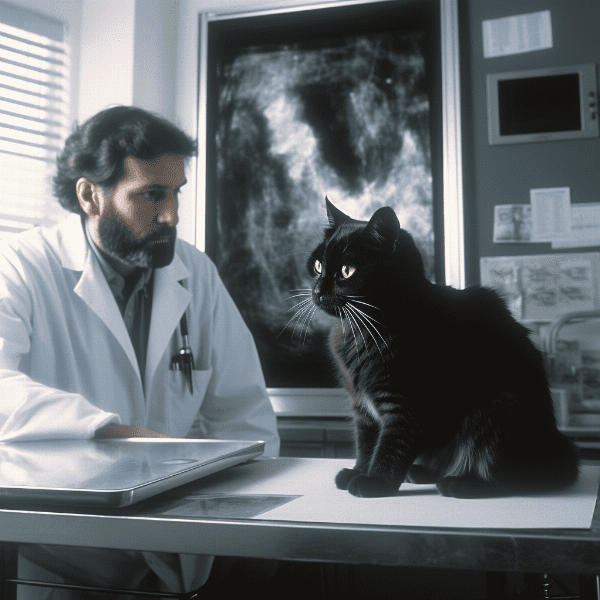
Signs and Symptoms to Watch for
As a cat owner, it is important to be aware of the signs and symptoms of stomach cancer in cats. Catching the disease early can greatly increase the chances of a successful outcome.
Loss of Appetite
One of the most common signs of stomach cancer in cats is a loss of appetite. If your cat suddenly stops eating or shows a decreased interest in food, it may be a cause for concern.
Weight Loss
Unexplained weight loss can also be a symptom of stomach cancer in cats. If your cat is losing weight despite maintaining their regular diet and activity level, it is important to consult with a veterinarian.
Vomiting and Diarrhea
Stomach cancer can also cause vomiting and diarrhea in cats. While these symptoms can be caused by other digestive system issues, it is important to rule out stomach cancer as a possible cause.
Abdominal Pain
Cats with stomach cancer may experience abdominal pain. They may show signs of discomfort or restlessness, and may be hesitant to jump or play.
Lethargy
If your cat is lethargic or shows a decreased interest in their usual activities, it may be a sign of stomach cancer. This symptom can be difficult to detect, as cats are naturally independent and often sleep for long periods of time.
It is important to note that these symptoms can be caused by other health issues, so a proper diagnosis from a veterinarian is crucial.
In conclusion, recognizing the signs and symptoms of stomach cancer in cats can help cat owners detect the disease early and seek prompt treatment. If you notice any of these symptoms in your cat, it is important to consult with a veterinarian as soon as possible.
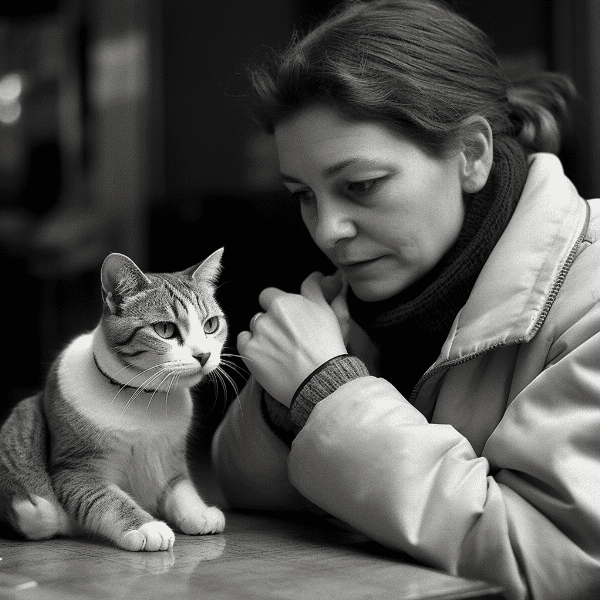
Diagnosis and Treatment Options
If you suspect that your cat may have stomach cancer, it is important to seek a proper diagnosis from a veterinarian. Here are some of the diagnostic and treatment options available for cats with stomach cancer.
Surgery
Surgery is often the first line of treatment for stomach cancer in cats. The goal of surgery is to remove as much of the tumor as possible. Depending on the location and size of the tumor, the veterinarian may need to remove a portion of the stomach or other affected organs.
Radiation Therapy
Radiation therapy uses high-energy radiation to kill cancer cells. This treatment is often used in conjunction with surgery and chemotherapy. Radiation therapy can have side effects, such as skin irritation and fatigue, but these can often be managed with medication.
.
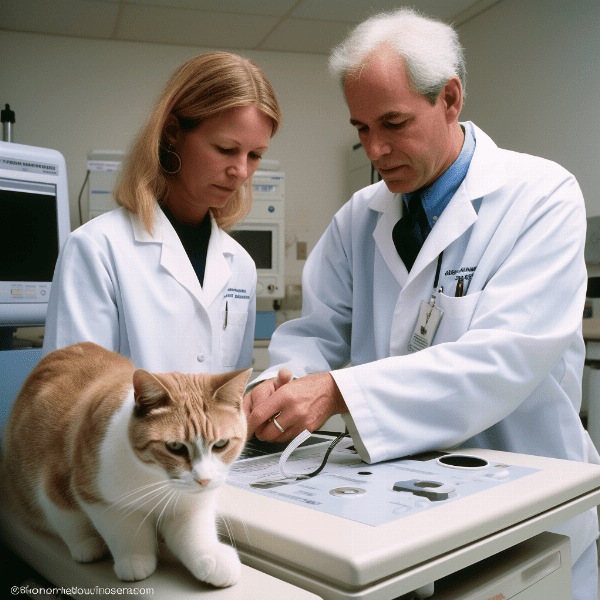
Prevention Strategies for Stomach Cancer
While there is no guaranteed way to prevent stomach cancer in cats, there are several strategies that can help reduce the risk. Here are some of the prevention strategies for stomach cancer in cats.
Feed a Balanced Diet
Feeding your cat a balanced diet that is rich in protein and low in carbohydrates may help reduce the risk of stomach cancer. Avoid feeding your cat processed foods and treats that are high in sugar or preservatives.
Avoid Environmental Toxins
Exposure to environmental toxins, such as second-hand smoke and household cleaners, can increase the risk of stomach cancer in cats. Avoid exposing your cat to these toxins whenever possible.
Regular Veterinary Check-ups
Regular veterinary check-ups can help detect any health issues early, including stomach cancer. Be sure to schedule annual exams for your cat, and bring them to the vet if you notice any changes in their behavior or appetite.
Reduce Stress
Stress can weaken the immune system and increase the risk of health issues, including stomach cancer. Provide your cat with a stress-free environment, and consider using calming aids, such as pheromone sprays or supplements.
Vaccination
In some cases, vaccination against certain viruses, such as the feline leukemia virus, can help reduce the risk of stomach cancer. Talk to your veterinarian about whether vaccination is appropriate for your cat.
In conclusion, there are several strategies that cat owners can use to help reduce the risk of stomach cancer in their pets. By feeding a balanced diet, avoiding environmental toxins, scheduling regular check-ups, reducing stress, and considering vaccination, cat owners can help promote their cat’s health and well-being.
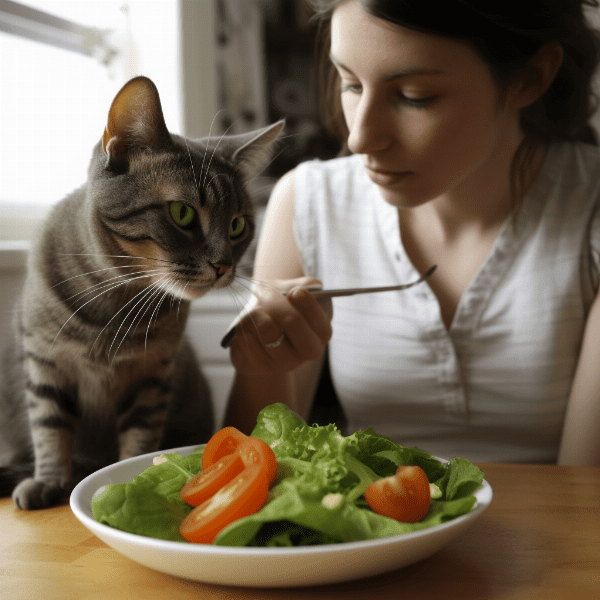
Nutritional Support for Cats with Stomach Cancer
Cats with stomach cancer may experience a loss of appetite and weight loss. Nutritional support can be crucial in helping them maintain their weight and strength during treatment. Here are some nutritional support strategies for cats with stomach cancer.
Offer Small, Frequent Meals
Cats with stomach cancer may have difficulty digesting large meals. Offer small, frequent meals throughout the day to help them maintain their appetite and prevent nausea.
Choose Easily Digestible Foods
Choose foods that are easily digestible, such as canned or cooked chicken or fish. Avoid feeding your cat dry kibble, which can be difficult to digest.
Consider Prescription Diets
Prescription diets formulated for cats with stomach cancer can help provide the necessary nutrients while being gentle on their digestive system. Talk to your veterinarian about whether a prescription diet is appropriate for your cat.
Use Appetite Stimulants
If your cat is experiencing a loss of appetite, your veterinarian may prescribe an appetite stimulant to help increase their interest in food. These medications can be effective in promoting eating and maintaining weight.
Provide Access to Fresh Water
Cats with stomach cancer may become dehydrated, especially if they are experiencing vomiting or diarrhea. Make sure that your cat has access to fresh water at all times, and consider offering wet food to help them stay hydrated.
In conclusion, nutritional support is an important aspect of caring for cats with stomach cancer. By offering small, frequent meals of easily digestible foods, considering prescription diets and appetite stimulants, and ensuring access to fresh water, cat owners can help their pets maintain their weight and strength during treatment. Consult with your veterinarian for specific recommendations for your cat’s nutritional needs.
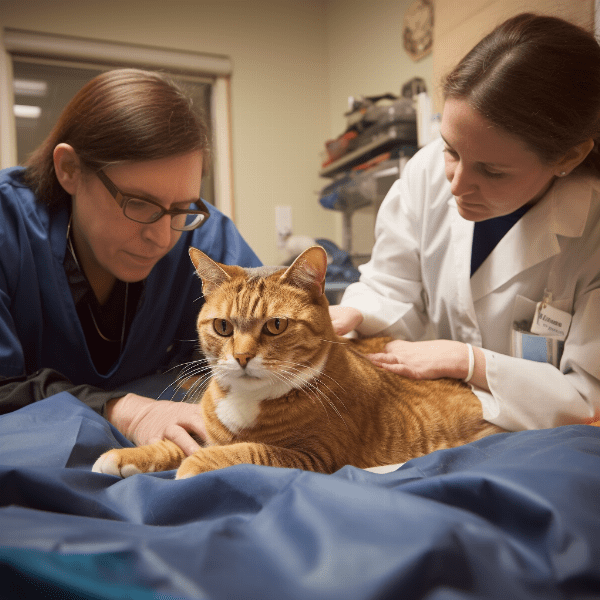
Coping with a Stomach Cancer Diagnosis in Your Cat
Receiving a diagnosis of stomach cancer in your cat can be a difficult and emotional experience. Here are some strategies for coping with a stomach cancer diagnosis in your cat.
Seek Support
Talk to friends, family, or a support group about your feelings and concerns. It can be helpful to connect with others who have gone through a similar experience.
Stay Informed
Learn as much as you can about your cat’s diagnosis and treatment options. Ask your veterinarian for information and resources, and do your own research to become more familiar with the disease.
Keep a Routine
Maintaining a routine can help reduce stress for both you and your cat. Stick to a regular schedule for feeding, playtime, and sleep.
Provide Comfort
Comfort measures, such as providing a cozy bed or soft blankets, can help your cat feel more relaxed and at ease. Spend quality time with your cat, providing them with love and attention.
Consider Palliative Care
In some cases, palliative care may be appropriate for cats with stomach cancer. Palliative care focuses on providing comfort and pain relief, rather than curing the disease. Talk to your veterinarian about whether palliative care is appropriate for your cat.
Make End-of-Life Decisions
In some cases, the prognosis for stomach cancer in cats may be poor. It is important to consider end-of-life decisions, such as euthanasia, if your cat’s quality of life becomes severely impacted.
In conclusion, coping with a stomach cancer diagnosis in your cat can be challenging. By seeking support, staying informed, maintaining a routine, providing comfort, considering palliative care, and making end-of-life decisions, cat owners can help provide the best possible care for their pets during this difficult time.
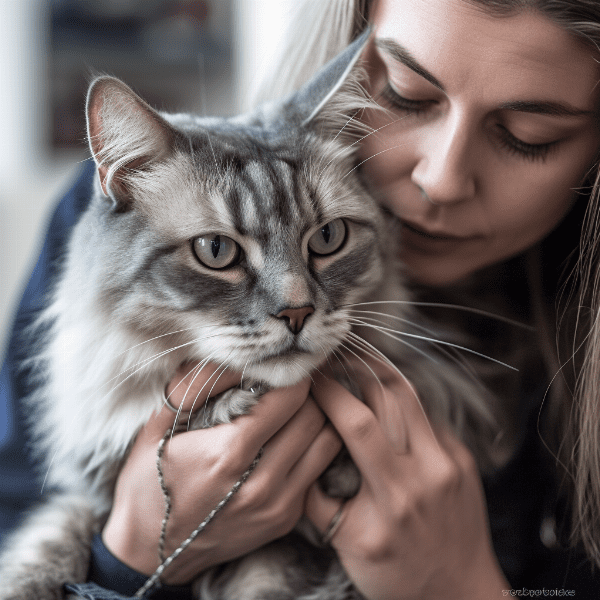
Follow-up Care and Monitoring
After your cat has been diagnosed with stomach cancer and has received treatment, it is important to continue with follow-up care and monitoring. Here are some strategies for ensuring the best possible outcome for your cat.
Schedule Regular Check-ups
Schedule regular check-ups with your veterinarian to monitor your cat’s progress and detect any potential issues early. Your veterinarian may recommend frequent check-ups initially, with longer intervals between visits as your cat’s health stabilizes.
Monitor for Recurrence
Stomach cancer can sometimes recur even after treatment. Monitor your cat for any signs or symptoms that the cancer may have returned, such as loss of appetite, weight loss, vomiting, or diarrhea.
Conduct Diagnostic Tests
Your veterinarian may recommend periodic diagnostic tests, such as X-rays or ultrasounds, to monitor for recurrence of the cancer. These tests can help detect any changes in your cat’s health before symptoms become apparent.
Nutritional Support
Continue to provide your cat with appropriate nutritional support, such as a balanced diet and appetite stimulants, if needed. Nutritional support can help maintain your cat’s strength and immune function, which can be important in preventing cancer recurrence.
Consider Preventative Measures
If your cat has previously been diagnosed with stomach cancer, it is important to take preventative measures to reduce the risk of recurrence. This may include maintaining a balanced diet, avoiding environmental toxins, and considering vaccination, as appropriate.
In conclusion, follow-up care and monitoring are important aspects of caring for cats with stomach cancer. By scheduling regular check-ups, monitoring for recurrence, conducting diagnostic tests, providing nutritional support, and taking preventative measures, cat owners can help ensure the best possible outcome for their pets. Consult with your veterinarian for specific recommendations for your cat’s follow-up care.
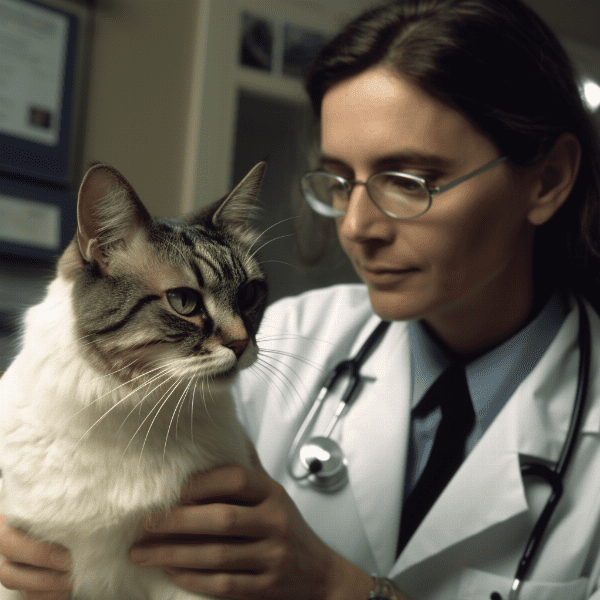
Other Digestive System Concerns in Cats
While stomach cancer is a serious concern for cats, there are other digestive system issues that cat owners should be aware of. Here are some other digestive system concerns in cats.
Inflammatory Bowel Disease
Inflammatory bowel disease (IBD) is a chronic condition that affects the digestive system. It occurs when the immune system attacks the lining of the intestines, leading to inflammation and digestive issues. Symptoms of IBD in cats include vomiting, diarrhea, and weight loss.
Pancreatitis
Pancreatitis is a condition that occurs when the pancreas becomes inflamed. The pancreas is an organ that produces digestive enzymes. When the pancreas becomes inflamed, it can lead to digestive issues, including vomiting and diarrhea. Other symptoms of pancreatitis in cats include abdominal pain and lethargy.
Gastrointestinal Obstruction
Gastrointestinal obstruction occurs when something becomes stuck in the digestive system, preventing the passage of food and causing blockage. This can occur in cats who eat objects they shouldn’t, such as string or toys. Symptoms of gastrointestinal obstruction in cats include vomiting, diarrhea, and abdominal pain.
Colitis
Colitis is a condition that occurs when the colon becomes inflamed. This can lead to diarrhea, often with blood or mucus present. Colitis in cats can be caused by a variety of factors, including food allergies or intolerances, parasites, or infections.
In conclusion, while stomach cancer is a serious concern for cats, there are other digestive system issues that cat owners should be aware of. Inflammatory bowel disease, pancreatitis, gastrointestinal obstruction, and colitis are all conditions that can affect the digestive system of cats. It is important to seek veterinary care if you suspect that your cat is experiencing digestive system issues.
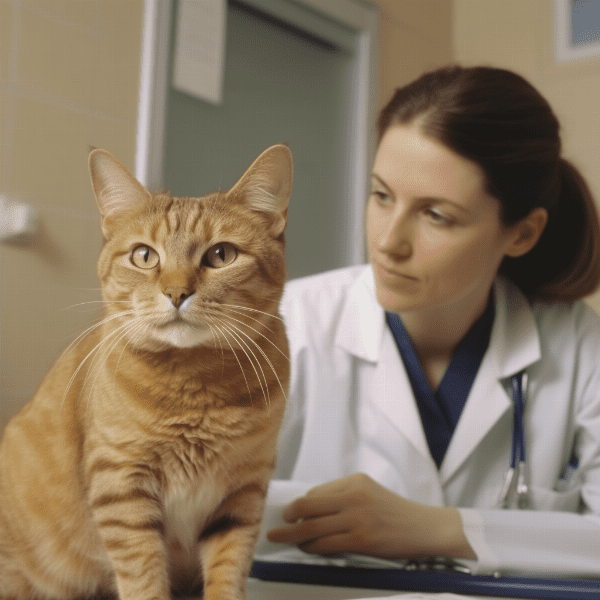
Research Advances and Future Outlook
Research into stomach cancer in cats is ongoing, with the goal of improving diagnosis and treatment options for affected cats. Here are some recent research advances and future outlooks in the field of stomach cancer in cats.
Genetic Research
Genetic research has identified certain gene mutations that may be associated with stomach cancer in cats. These findings could lead to improved diagnostic tests and targeted treatments for affected cats.
Immunotherapy
Immunotherapy is a treatment option that uses the body’s own immune system to fight cancer. This treatment is currently being investigated as a potential option for cats with stomach cancer.
Improved Diagnostic Tests
Advances in diagnostic testing, such as the use of liquid biopsies, could lead to earlier detection of stomach cancer in cats. This could greatly improve the chances of a successful outcome for affected cats.
Palliative Care
As veterinary medicine continues to advance, there is a growing focus on palliative care for cats with advanced or terminal illnesses, including stomach cancer. Palliative care focuses on providing comfort and pain relief, rather than curing the disease, and can greatly improve the quality of life for affected cats.
In conclusion, research into stomach cancer in cats is ongoing, with the goal of improving diagnosis and treatment options for affected cats. Genetic research, immunotherapy, improved diagnostic tests, and palliative care are all areas of focus in the field. While there is still much to be learned about stomach cancer in cats, advances in research offer hope for improved outcomes and better quality of life for affected cats.

Resources for Cat Owners Dealing with Stomach Cancer
Dealing with a stomach cancer diagnosis in your cat can be challenging, but there are resources available to help support you and your pet. Here are some resources for cat owners dealing with stomach cancer.
Veterinary Specialists
Seeking the advice and treatment of a veterinary specialist, such as an oncologist or internal medicine specialist, can be crucial in providing the best possible care for your cat. These specialists have specialized training and experience in treating stomach cancer in cats.
Support Groups
Support groups can provide a valuable source of support and information for cat owners dealing with stomach cancer. These groups can be found online or through local veterinary clinics or animal hospitals.
Online Resources
There are many online resources available for cat owners dealing with stomach cancer. These resources can provide information on diagnosis, treatment options, and coping strategies, as well as connect you with others who are going through a similar experience.
Palliative Care Providers
If your cat has been diagnosed with advanced or terminal stomach cancer, palliative care providers can help provide comfort and pain relief. These providers can offer a range of services, such as hospice care or pain management, to help improve your cat’s quality of life.
Pet Loss Support Groups
In some cases, cat owners may need to make end-of-life decisions for their pets. Pet loss support groups can provide a source of support and understanding during this difficult time.
In conclusion, there are several resources available to cat owners dealing with stomach cancer. Veterinary specialists, support groups, online resources, palliative care providers, and pet loss support groups can all provide valuable support and information for cat owners during this challenging time. Don’t hesitate to reach out for help and support as you navigate your cat’s diagnosis and treatment.



